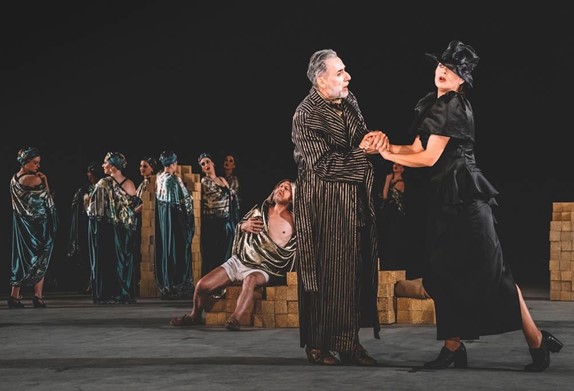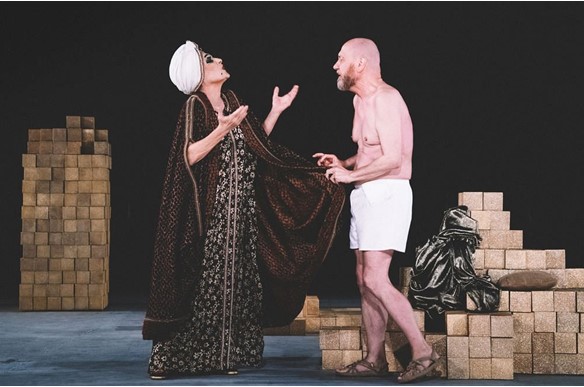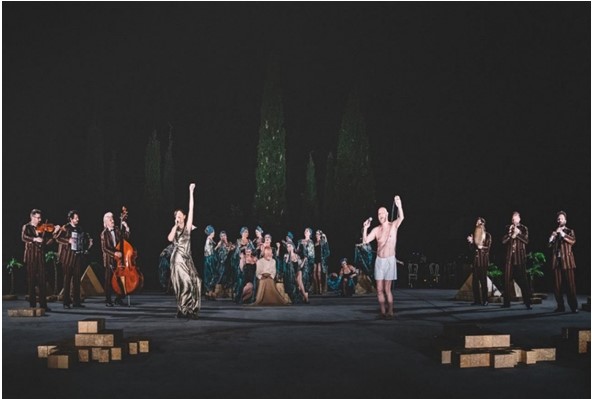Eleni of Euripides
Τοπαλίδου Σοφία Γ5
Last summer my dad and I went to Thessaloniki to see the play Eleni of Euripides.The performance of the State Theater of Northern Greece premiered at the Forest Theater, directed by Vassilis Papavassiliou. Eleni of Euripides is one of the hybrid and very interesting works of the ancient Greek literature full of action and mobility of the heroes. In the course of the project there is what we would say a sense of ripple. And this is the great difficulty of «Eleni». Difficulty and charm together. Eleni is capable of many colors of interpretation.
Vassilis Papavassiliou who is very experienced took the heroes from the pedestal of the epic and presents them realistically, as living and not perfect people, who walk on a modern theatrical path and, perhaps, more painless, since adorns with comic elements and intense doses of parody. The style, the line of the performance has a conceptual meaning and stigmatizes a modern perception of hilarious tragedy. The moral, philosophical or social issues of the tragedy emerge on the scene and prove that our troubled time is a fruitful period for the revival of ancient Greek drama.
Eleni (Emily Koliandri)
The simple scenery symbolizes the country of Egypt, with its emblematic elements scattered (pyramids, palm trees) in the orchestra. His costumes are in the glittering shades of lame fabric. All together they embrace the tomb of Proteus, while the troupe with a sense of stage time and codes with a special load, and complete an alternative way of approaching tragic poetry, through concepts such as musicality, purity, cheerful centrality. The discreet lighting choices skillfully illuminated even the least readable aspects of the work and in combination with the atmospheric sounds of jazz, tango and other solid sounds, contributed the most to a perfectly harmonized, scalable sound on stage. The movement on the other hand was playful, suggestive and laxative, in perfect agreement with the direction of the play. With more detailed speech and responsible interventions in the choirs, the translator Pantelis Boukalas rendered the style and meaning of Euripidean speech, with maturity, but also timeless touches, which connect the past with the present in a cheerful, grotesque and extremely successful coupling.
Eleni and women of the Dance
The Euripidean climate was therefore rendered reborn, fresh, enriched with modern elements, projecting Eleni, as a work that does not represent the modern, but is actually one. It is a smashing result, worthy of the spectators” expectations. Euripides is characterized as the stage philosopher. With «Eleni» Euripides expresses his own views and concerns on various issues: rationalism, divination, the right way of thinking and acting, God, the institution of slavery. These issues occupied the philosophers of his time, so he seems to be a philosopher on stage. Through the intellect of persons, he expresses his philosophical ideas.
Whether a cloud in Troy or an incarnation in Egypt, Eleni, despite her numerous representations and readings, remains between the «is» and the «appear» mythical personality over time. The unique beauty, the incompatible desire, the insulted personal revolution, the return to the marital bed… Either as a cause or as a latent reason, sieges, riots, tragic losses and a long war bears its name. Between life and death, her lyrical-dramatic image is decisive.
Eleni (Emily Koliandri) and Theoklymenos (George Kafkas)
The lights of the theater are on. The spectators take their seats. They chat quietly and wait. First, second, third bell, the lights go out. The show begins. At this moment, probably no spectator wonders how far are the roots of the show that unfolds before his eyes.
Historical frame
Eleni of Euripides was written in 412 BC and appeared for the first time at the same time, that is, the Sicilian campaign had just ended with the destruction of the Athenian fleet. At the same time, the sophist movement was developing, which had begun to question traditional values and, with the criticism of its representatives, was causing a crisis in the democratic state and phenomena of disrespect. In this context, Euripides with the tragedy of Eleni condemns the war as the consul of all evils and under the pretext of Eleni tried to emphasize the absurdity of the Trojan War. Thus, in the absurdity of the view that for a woman people and a state can be exterminated and thousands of Greeks killed, Euripides will answer with the absurdity of the «idol», that is, the myth he uses literary is not his Homeric version, but this created by the lyric poet Stisichoros. After the one and only that Homer gives us. To come after the others, of the aforementioned poets, historians and orators, but also later ones such as Isocrates, Ronsard, Goethe, Offenbach, Girondou, Ritsos and others, and others, of that number. And so on. «
Gerontissa (Efi Stamouli) and Menelaos (Themis Panou)
Case
Euripides claims that the real Eleni never went to Troy. Only her idol went there. That is because Hermes stole her idol, following the will of Hera, and handed it over to Proteus, the king of Egypt, to protect it. But when he died, his son Theoclymenos tried to make her his wife and she fled as a beggar to the tomb of Proteus. So Menelaos is presented in it. He has lost his ships at sea and is trying to save his few companions who are hiding in a cave. The two spouses are recognized and after a fraudulent plan they manage to secretly return to their homeland.
The Troupe
Σχολιάστε
Για να σχολιάσετε πρέπει να συνδεθείτε.







